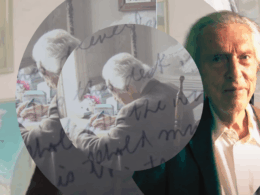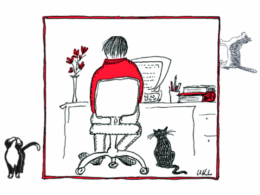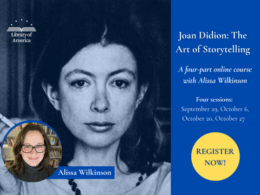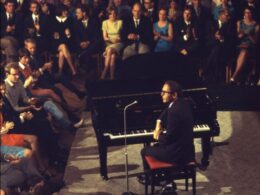In an early passage in the series of lectures later published as One Writer’s Beginnings (1984), Eudora Welty reflected on her training as a child:
You learned the alphabet as you learned to count to ten, as you learned “Now I lay me” and the Lord’s Prayer and your father’s and mother’s name and address and telephone number, all in case you were lost.
That last phrase touched a nerve when she sent the lectures to her close friend and editor William Maxwell:
“In case you were lost” struck a responsive chord in my soul. I was lost, or thought I was. In Peoria. My mother was shopping in Block and Kuhl’s department store and thinking I was sufficiently absorbed with the toys I wouldn’t notice her absence, whipped up to the floor above to look at linen sheets, and when I turned around and she wasn’t there, it was as if a pit opened in front of me. What tears. There I was far from home. No mother. I sometimes wonder how I got through the remaining seventy years of my life.
Maxwell’s mother died of influenza when he was ten and, as Christopher Carduff notes in his LOA interview about Maxwell, it was “the defining event of his early life. . . In a very real sense the world stopped for him in the winter of 1918, and almost all of his best writing is a moving, literary attempt to re-create and preserve that world.” Maxwell re-examined his mother’s death in two novels, They Came Like Swallows and So Long, See You Tomorrow.
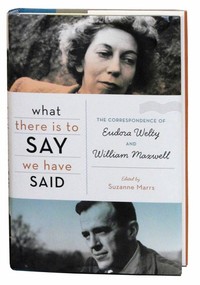
The intimate novelistic detail in Maxwell’s letter is wonderfully typical of the exchanges in the 300 letters included in What There is to Say We Have Said: The Correspondence of Eudora Welty and William Maxwell, edited by Welty biographer Suzanne Marrs and published earlier this year by Houghton Mifflin. Welty and Maxwell first met in New York when both were both in their early thirties. Welty was already a published writer and Maxwell, eager to acquire one of her pieces for The New Yorker, immediately began corresponding—and the letters between New York and Mississippi continued for more than fifty years.
Yet, it was nine years before Maxwell succeeded in convincing The New Yorker to take a Welty story. Harold Ross found “The Whole World Knows” “too arty.” The breakthrough came in 1951 with “The Bride of the Innisfallen” (I love your train story beyond all possibility of telling you”), followed quickly by “Kin” (I read “Kin” right straight through, looking for large sections that could be cut, and I couldn’t find any”) and “No Place for You, My Love” (“It’s beyond praise”). Maxwell edited all seven works Welty published in The New Yorker: five stories and two novels. By the time the correspondence reaches one of Welty’s last stories, “The Demonstrators,” more specific points of editing get addressed, as when Welty writes:
Dashes I like better than parentheses—remembering Mark Twain’s remark from somewhere, “He who would wantonly use a parenthesis would steal”—so if you agree, dash it.
Welty captured what she treasured about letter writing in her introduction to The Norton Book of Friendship:
All letters, old and new, are the still-existing parts of a life. To read them now is to be present when some discovery of truth—or perhaps untruth, some flash of light—is just occurring. It is clamorous with the moment’s happiness or pain. To come upon a personal truth of a human being however little known, and now gone forever, is in some way to admit him to our friendship. What we’ve been told need not be momentous, but it can be as good as receiving the darting glance from some very bright eye, still mischievous and mischief-making, arriving from fifty or a hundred years ago.
There are occasions when Maxwell draws inspiration from Welty, as when he dislikes Knopf’s jacket copy for So Long, See You Tomorrow so much he rewrites it:
At the end of two days . . . at my wit’s end, I helped myself to a sentence from your letter in order to get the bloody thing out of the house: “It has an inner force that never lets go.” And without giving you credit, since that would be the same thing as asking for a quote, which I would rather put my head on the railroad tracks in front of an incoming train than do to my friends.
In her introduction, editor Marrs describes the unusual affinity the two writers had:
The keen intellect, the sense of humor, the lack of self-absorption, the embracing of experience in all its complexity, the capacity for love, the generosity of spirit, and the ability to face loss and death—these constitute the invisible signatures of Welty and Maxwell, signatures that are as powerfully present in their letters as in their fiction.
